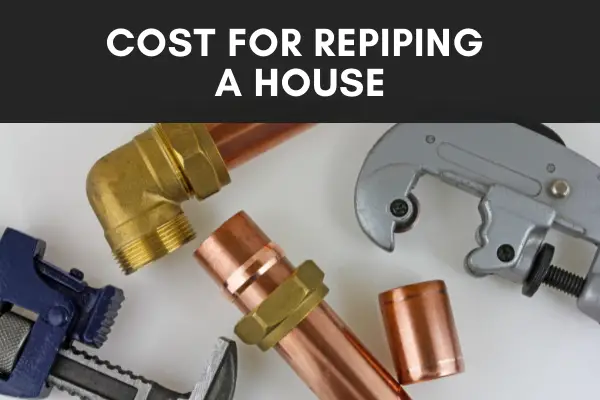If your old pipes are causing issues with your running water, it may be time to replace them.
Repiping a house can cost anywhere from $4,000 to $8,000, with an average expense of $6,000. You can also multiply the square footage of your home by $4.50 for a rough repiping estimate. The total cost will depend on the size of your home, where the pipes are located, what kind of pipes you’re installing, and the number of plumbing fixtures in your home.
Keep reading below for our repiping-cost breakdown, what the process consists of, and how to know when it’s time to change your plumbing.
Repiping Cost Factors
A one-bed one-bath home built in 2000 will not cost the same to repipe as a 3,000-square foot home built in 1940. Everything from the size of your home to the material of the new pipes will affect your repiping cost.
The Size of Your Home
It’s no surprise that a larger home will cost more to repipe, but how much more exactly? You can get a rough estimate of your repiping cost by multiplying your home’s square footage by $4.50. This is a ballpark number that will give you a general idea of your expenses including labor and materials.
How many floors your home has will also affect your price. If your pipes run through an unfinished basement or attic space, you’ll need to add that square footage into your calculations.
Location of the Pipes
If your pipes are located in areas that are more difficult to reach – such as crawlspaces or closets – the cost of labor to replace them will increase. On the other hand, changing out plumbing systems behind the drywall in bathrooms or kitchens is done more quickly and costs less.
New Pipe Material
For a more detailed estimate, you should consider the price of the new pipes that will be installed.
There are many types of pipes used in residential plumbing systems. Some of the most common are:
- PVC pipes, or polyvinyl chloride pipes, are usually used for sinks, toilets, and shower drains. PVC pipes are very durable and protect water from corrosion better than other materials. You can find these for around $1.46/ft.
- CPVC pipes add chlorine to strengthen PVC pipes. These run around $1.78/ft.
- PEX pipes are cross-linked polyethylene pipes. They are used for water supply lines and are flexible when it comes to installation. This material could cost around $1.15/ft and is usually the most cost-effective choice when repiping a home.
- Galvanized steel pipes have been dipped in a zinc coating and are seen in homes built before the 1970s. They are about $2.53 per foot, but they are not used in modern construction or repiping.
- Copper pipes have been around for decades. They are corrosion-resistance and cost around $2 per foot but can be more expensive depending on their thickness.
These prices are general estimates as of June 2022 and do not include labor costs.
Plumbing Fixtures
The more plumbing fixtures your home has, the more labor is needed to repipe the home. Common plumbing fixtures include:
- Sinks
- Washing machines
- Boilers
- Pools (in the backyard)
- Bathtubs
- Bidets
- Toilets
The Process of Repiping a House
Repiping a house requires prep work, pipe replacement, and finishing work.
Prep Work
If you reside on the property, you may want to vacate the house during the repiping process. Your water will likely need to be shut off for 1-3 days, making day-to-day living more problematic. Depending on where your pipes are located, you may be able to remain in the house, only accessing the areas cleared by the supervising plumber.
You should cover any furniture in the areas where the repiping will take place. Cutting into drywall can create dust that spreads throughout the room. Remove any belongings in your bathroom vanities and cabinets.
The plumbers on the job will also pull any required permits from your city during the prep period.
The Repiping Process
Certain kinds of repiping, such as with PEX pipes, can be done in one workday. If you have other types of pipes – like copper – or a larger home, repiping could take longer.
During the process, plumbers will use special tools to locate the exact location of your old pipes. Pipes in the floor are usually reached from the ceiling underneath or the basement.
Then, they’ll remove your old plumbing system and replace it with the new one. You also have the option of upgrading your fixtures or expanding your plumbing system if desired.
Finishing Work
Since drywall and ceilings will need to be opened to reach the pipes, the plumbers will patch up and repaint any areas that were disturbed afterward. The new plumbing system will be tested upon completion.
With a new plumbing system, you may notice that your water flow has improved, as well as an improvement in the taste of your tap water. Your water bill may also be lower after repiping.
When to Repipe a House
Repiping a home depends on the conditions of the home and its surroundings. Your original pipe materials, when your home was constructed, and how often you use your plumbing system will affect the wear and tear of your pipes.
Here are the general estimates of how long pipe material is built to last:
- PVC: 30-40 years
- PEX: 30-50 years
- Copper: 50-70 years
- Galvanized steel: up to 100 years
If you know your house hasn’t been repiped in a long time, you may notice some signs of rusty or broken-down pipes:
- Discolored water
- Leaks
- Frequent clogs
- Low or inconsistent water pressure
- Tap water with a weird taste
- Mold or corrosion that forms on or near exposed pipes
Final Thoughts
Repiping a home costs an average of $6,000. You can create a more precise rough estimate by multiplying your square footage by $4.50.
The price of repiping a home depends on how large it is, how many plumbing fixtures it has, the material of the old and new pipes, and the location of the old pipes.
By hiring a professional plumbing company, you can have your home repiped in as little as one day. Larger projects could take a few days, however, and your water accessibility will be limited during this time.
Always ensure you are hiring an experienced plumbing company that will follow all permitting and licensing requirements to finish the project both efficiently and professionally.


